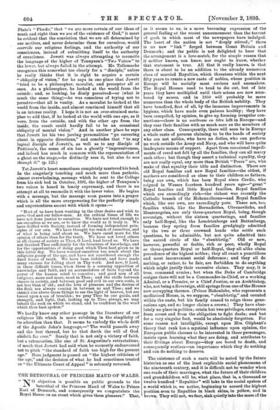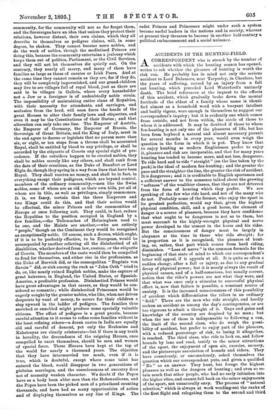THE BETROTHAL OF PRINCESS MAUD OF WALES.
"NO objection is possible on public grounds to the betrothal of the Princess Maud of Wales to Prince Karl of Denmark, and consequently we congratulate the Royal House on an event which gives them pleasure." That,
as it seems to us, is a more becoming expression of the general feeling at the recent announcement than the torrent
of gush in which most of the newspapers have indulged.
The heart of the nation is not " deeply stirred; " there is no new " link " forged between Great Britain and Denmark; and the public is not delighted to hear that the arrangement is a love-match, for the simple reason that it neither knows, can know, nor ought to know, whether that statement is true. All that it really knows, is that there is about to be an addition to the already numerous class of married Royalties, which threatens within the next fifty years to create a new caste of nobles, whose position in Europe will be socially most curious and anomalous. The Royal Houses used to tend to die out, but of late
years they have multiplied until their scions are now num- bered by scores, and in 1950 will probably be more numerous than the whole body of the British nobility. They have benefited, first of all, by the immense improvements in hygiene, which have made even palaces healthy; they have been compelled, by opinion, to give up forming irregular con- nections—there is no maitresse en titre left in Europe—and they rear their families with as much care as the members of any other class. Consequently, there will soon be in Europe a whole caste of persons claiming to be the heads of society who are not nobles, who have no duties, who can perform no work outside the Army and Navy, and who will have quite inadequate means of support. Apart from occasional impedi- ments of creed not felt by all the families, they can all marry each other; but though they assert a technical equality, they are not really equal, any more thaw British "Peers" are, who make of that equality their title and distinction. There are old Royal families and new Royal families—the oldest, if mothers are considered as close to their children as fathers, being our own, which has been Royal since Cerdic, who reigned in Wessex fourteen hundred years ago—" great" Royal families and little Royal families, Royal families which are exceedingly rich—the richest was recently the Catholic branch of the Hohenzollerns—and Royal families which, like our own, are exceedingly poor. There are, too, families which, like the Bernadottes, Obrenovitchs, and Montenegrins, are only three-quarters Royal, being, though sovereign, without the sixteen quarterings, and families only half-Royal, like the Leuchtenbergs and Battenbergs, because they spring from families grudgingly admitted by the two or three crowned heads who settle such questions, to be admissible, but not quite admitted into the sacred circle of the " ebenbiirtig." Old or new, however, powerful or feeble, rich or poor, wholly Royal or three-quarters Royal or half-Royal, they all alike claim precedence of the highest nobles ; they all exact a punctilious and most inconvenient social deference ; and they all do nothing, or rather, to be fair, are forbidden to do anything which might justify their excessive claims. They may, it is true, command armies ; but when the Duke of Cambridge resigns there will not be a Commander-in-Chief, or a working Admiral, or a Premier, or a Chief Justice, or an Archbishop, who, not being a Sovereign, still springs from one of the Houses now occupying thrones. (Prince Hohenlohe, who represents a mediatised House, is, we suppose, " ebenbiirtig," and counted within the caste, but his family ceased to reign three gene- rations ago, and no longer claims a crown.) They have abso- lutely no place in politics ; retain but two privileges, exemption from arrest and from the obligation to fight duels; and but for a very singular fact, would be absolutely forgotten. For some reason not intelligible, except upon Mrs. Oliphant's theory that rank has a mystical influence upon opinion, the European public chooses to be interested in these personages, insists upon learning what they are doing, and attributes to their fittings about Europe—they are bored to death, and consequently restless—an importance which they do nothing and can do nothing to deserve.
The existence of such a caste will be noted by the future historian as one of the least explicable social phenomena of the nineteenth century, and it is difficult not to wonder when one reads of their marriages, what the future of their children and grandchildren will be, what place, that is, a thousand or twelve hundred " Royalties" will take in the social system of a world which is, we notice, beginning to accord the highest position even to Royalties in black skins, in yellow, and in brown. They will not, we fear, sink quietly into the mass of the
community, for the community will not so far forget them, and the Sovereigns have an idea that unless they protect their relations, however distant, their own claims, which they all describe to themselves as pedigree claims, will, in some degree, be shaken. They cannot become mere nobles, and do the work of nobles, though the mediatised Princes are doing this, because the community entertains a jealousy which keeps them out of politics, Parliament, or the Civil Services, and they will not let themselves die quietly out. On the contrary, they nearly all marry, and many of them have families as large as those of curates or Irish Peers. And at the same time they cannot remain as they are, for if they do, they will be completely impoverished, and our grand-children may live to see villages full of royal blood, just as there are said to be villages in Galicia, where every householder not a Jew or a foreigner is of undoubtedly noble strain. The impossibility of maintaining entire clans of Royalties, with their necessity for attendants, and carriages, and seclusion from the herd, will soon force the heads of the great Houses to alter their family laws and etiquettes, and even it may be the Constitutions of their States ; and that alteration can only take one line. The Emperor of Austria, the Emperor of Germany, the Emperor of Russia, the Sovereign of Great Britain, and the King of Italy, must in the end agree to decree or legislate that no person more than six, or eight, or ten steps from a throne shall be accounted Royal, shall be entitled by blood to any privilege, or shall be accorded by the etiquette of Courts any special right of pre- cedence. If the outsiders happen to be created nobles, they shall be nobles merely like any others, and shall rank from the date of their creations, as the Duke of Beaufort or Lord Elgin do, though they spring in a way from lines that have been RoyaL They shall receive no money, and shall be in fact, in everything except their pedigrees, which are beyond control, members of the ordinary community,—men like the Swiss 'nobles, some of whom are as old as their own hills, yet all of whom are in title, as well as privileges, simply commoners. It is, we fancy, certain that the three Emperors and two Kings could do this, and that their action would be effectual, the minor Princes and the communities of Europe at once following suit. They could, in fact, reduce the Royalties to the position occupied in England by a few families,—the Tollemaches of Helminghara used to be one, and the Malets are another,—who are entirely "people," though on the Continent they would be recognised as exceptionally noble. Of course, such a decree, which ought, if it is to be perfectly effective, to be European, would be accompanied by another relieving all the disinherited of all disabilities, whether derived from law, custom, or the etiquette of Courts. The members of the caste would then be compelled to fend for themselves, and either rise in the professions, as the Duke of Berwick did, or the cosmopolitan " Eugenio von Savoie " did, or sink among the ruck as "John Orth " tried to do, or, like nearly ruined English nobles, make the capture of great heiresses, in England, the United States, or Spanish. America, a profitable profession. Disinherited Princes would have great advantages in that career, as they would be con- sidered so romantic ; while disinherited Princesses would be eagerly sought by the greater nobles, who like, when not driven desperate by want of money, to secure for their children a step upward in the ladder of pedigree. The families thus enriched or ennobled might produce some specially valuable citizens. The effect of pedigree is a great puzzle, because careful attention to it seems to refine some families without in the least refining others—a dozen castes in India are equally old and careful of descent, yet only the Brahmins and Kshetreyas are clearly aristocrats—but if there is any truth in heredity, the descendants of the reigning Houses, once compelled to exert themselves, should be men and women of special force. Those Houses have kept at the top of the world for nearly a thousand years. The objection that they have intermarried too much, even if it is true, which is doubtful, except where some taint has entered the blood, would disappear in two generations of plebeian marriages, and the consciousness of ancestry does not of necessity weaken character. We doubt if the Popes have as a body been abler men than the Hohenzollern, and the Popes have been the picked men of a priesthood counting thousands, and have had as many opportunities of action and of displaying themselves as any line of Kings. The cadet Princes and Princesses might under such a system become useful leaders in the nations and in society, whereas at present they threaten to become in another half-century a political embarrassment and a social nuisance.



















































 Previous page
Previous page